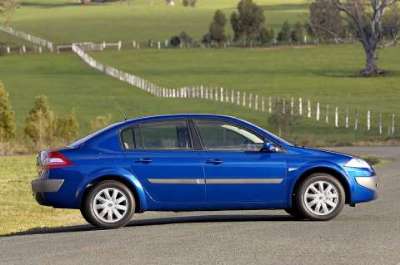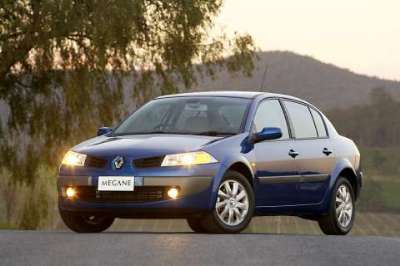|
| ||||||||||||
|
Renault Adds Diesel to Megane Sedan Line-Up
9th August, 2007 | |||||||||||
|
Renault has increased the size of its well-priced Megane Sedan range with the introduction of three diesel-powered models fitted with one of Europe’s most popular common-rail-injected diesel engines. “The new 1.9 dCi Megane Sedan offers all the benefits of diesel motoring in a refined European package along with the Renault’s outstanding levels of safety,” says Renault Australia Managing Director Rudi Koenig. “Customers will also find the dCi Megane Sedan is extremely well equipped, making it one of the best-value European sedans available on the market today.” Model Line-Up The Megane sedan range now includes six models in total. The entry-level Expression is available with a 2.0 litre petrol or 1.9 litre diesel engine in six-speed manual or 4-speed automatic versions. The top-of-line, automatic-only, Privilege is available in petrol or diesel variants. Standard features on the Expression include climate control air conditioning, a single in-dash CD player with satellite controls, automatic headlights, rain sensing wipers, cruise control with speed limiter, electric front and rear windows and door mirrors, 60/40 split fold rear seats, air-chilled glove box, 16” steel rims with covers (petrol models), 16” alloy wheels (diesel models), side and rear sunshades, trip computer and outside temperature gauge, front fog lights and a “see me home” headlight function. The top-spec Privilege has all the Expression’s features and equipment with the addition of a leather trimmed upholstery, leather steering wheel and gear knob, rear parking proximity sensors, a six-stack in-dash CD player, floor mats, 17” alloy wheels, body-coloured side mouldings and bumper inserts and satin- chrome door handles. 1.9 Litre Turbo-Charged Common-Rail Diesel Engine Superior fuel economy is one of the key drivers behind the current surge in demand for diesel-powered passenger cars. But while most diesel-engines deliver in terms of fuel economy questions are often asked by "non-converts" on their ability to match the refinement of their petrol-powered counterparts. The new dCi Megane Sedan is an extremely refined product and provides a challenging standard, for vehicles in this price range, in terms of interior noise levels and driving pleasure on top of the excellent fuel economy. An example of the technology applied to reduce noise and vibration - both during the warm-up period and in normal operation – sees the common-rail system supply a pre-injection (or pilot injection) several thousandths of a second before the main injection. This optimises the rate of pressure rise and lowers thermal loads at the moment of combustion, greatly reducing rattle. Performance and Economy When matched to the six-speed manual transmission the 1.9 dCi engine produces a maximum power output of 96 kW @ 4,000rpm and maximum torque of 300 Nm at 2,000 rpm. When combined with the four-speed automatic transmission the power output remains the same with a maximum torque of 260 Nm at a very low 1,600rpm. While the maximum power output is slightly lower (2kW) than the 2.0 litre petrol-powered Megane Sedan, the 1.9 litre dCi diesel produces 57% more torque in manual format when compared to the petrol version (36% more when teamed with the automatic transmission). The fuel economy numbers are equally impressive. With a combined cycle (ADR 81/01) result of 5.8 litres/100km for the manual version the dCi Megane Sedan returns a 30% improvement when compared to its petrol partner. The automatic version returns 6.8 litres/100km, a 20% improvement over the petrol version. Based upon these numbers the 60 litre fuel tank has a range of 1,034 kilometres)* for the manual and 882 kilometres* for the automatic. * Actual fuel consumption figures will vary depending on traffic, road and vehicle condition and how the car is driven. Safety Standard Standard safety equipment includes electronic stability control (with understeer control), six airbags (front, side and curtain), ABS brakes with electronic brake force distribution and emergency brake assist plus cruise control with a speed-limiter function. Design Detail The attention to detail on a variety of features throughout the sedan range underlines the quality of the vehicle. Thoughtful items such as cleverly integrated storage spaces, air-chilled glove box, an aviation-style handbrake which frees up space for storage underneath the central armrest, an integrated fuel filler cap and built-in sunshades for rear seat occupants are all standard. Recommended Retail Prices*
(* - Plus dealer delivery, stamp duty and other on road costs.) Technical Notes – Renault 1.9 dCi common-rail diesel engine As the name suggests, the ‘Common Rail’ system uses a rail - not a distributor pump - within which the injection pressure is maintained independent of the engine speed and controlled according to the engine’s output needs. The injectors for each cylinder are electronically fed directly from this ‘common rail’, precisely controlling the quantity of fuel injected and the timing of the injection. Injection pressures in the ‘Common Rail’ engine can reach 1,350 bar, resulting in the formation of far smaller fuel droplets in the injection spray and by this means ensures much more homogenous mixing with the air. Combustion is therefore more complete and emissions of smoke and particulates, including CO2, are reduced. 
The engine is supercharged by means of a turbocharger with ‘multi-vane’ variable geometry, pneumatically controlled via a variable cyclic-ratio valve. Varying the angle at which the exhaust gas hits the turbine according to load and engine speed allows the variable-nozzle turbo to function as a small turbo with very low inertia and very short response time at low speed and load. At higher engine speeds it behaves like a larger turbo, allowing the engine to be pressure-fed. Thanks to the continuous variation of the vane position, the change in performance is progressive. An EGR (exhaust gas recirculation) valve allows burned exhaust gas to be mixed with incoming air at medium speeds to reduce the formation of oxides of nitrogen (NOx), reducing emissions. In addition to the conventional catalytic converter, an oxidising pre-catalyst installed close to the turbocharger results in better emissions performance from cold. A reduction in the amount of engine rattle when cold is achieved through pre-injection which allows combustion to take place progressively, avoiding too steep a rate of pressure rise. Balancer shafts, weighing only 7 kg and housed in the cylinder block aid NVH reductions significantly. | ||||||||||||
ABN 47106248033 |
 |
All rights reserved. |
